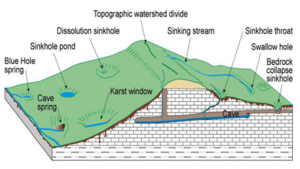Karst is a terrane formed from the dissolution of soluble rocks such as limestone, dolomite, and gypsum. It is characterized by underground drainage systems with sinkholes and caves. Kentucky is one of the most famous karst areas of the world. Much of Kentucky's prime farmland is underlain by karst. A substantial portion of the Daniel Boone National Forest, with its important recreational and timber resources, is underlain by karst. Caves also provide recreational opportunities and contain unique ecosystems. Mammoth Cave, with over 350 miles of passages, is the longest surveyed cave in the world. Springs and wells in karst areas supply water to thousands of homes.

Karst
terranes are often characterized by the rapid movement of water through underground channels and conduits. This rapid movement of water renders karst
terranes sensitive to groundwater pollution. Because of the importance of karst to Kentucky, The Groundwater Section is vitally interested in the study, evaluation and protection of karst
terranes. Karst investigations focus on mapping the extent of karst basins through dye tracing, the characterization of groundwater quality, and the evaluation of karst hazards.